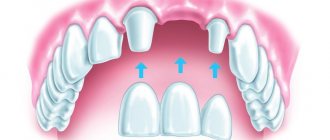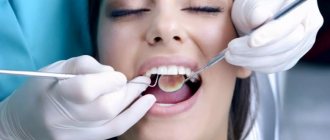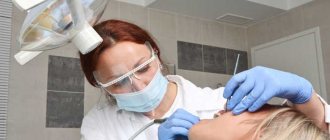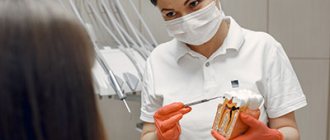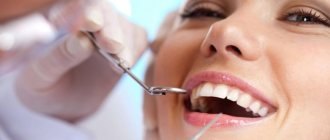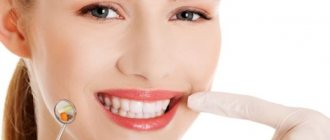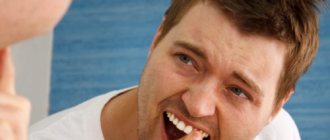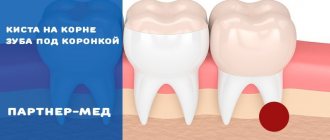Why did the crown fall off?
Most often, the process of swallowing is invisible; a person understands this only after finishing the meal and the absence of an artificial tooth. Usually the cause is the consumption of solid foods, for example, the process of chewing tough meat. If the problem occurs shortly after dental prosthetics, the reason is poor-quality installation and unreliable fixation of the crown. The second option is that the crown fell off after a long time. Most likely, the prosthesis has expired, so the artificial material could not withstand the next load.
What to do if a child swallows a foreign body - actions of parents
Babies are very inquisitive, and when they begin to move independently, the risk of swallowing a foreign body increases significantly. Doctors note that most often various foreign objects are removed from the body of children aged from 1 year to 5-6 years - this period is characterized as cognitive. Some pediatricians and surgeons even have a “museum” of foreign bodies extracted from children’s bodies. The most common ones are balls, chewing gum and tablets.
If the first two, in principle, do not pose a danger, then when swallowing the tablet, you will need gastric lavage and detoxification therapy - this is the doctors’ instructions. What should parents do if a child swallows a foreign body?
What you should absolutely not do
First, parents should not shake their baby, turn him upside down, or actively hit him on the back. Such actions can lead to the rotation of a foreign body in the esophagus and its entry into the respiratory tract - these conditions are potentially life-threatening for the child. If a child swallows a piece of an object, it may have sharp edges, and in this case, any concussions can lead to injury to the esophagus, stomach or respiratory tract (if the body has moved into them).
Secondly, you should not try to push a foreign body deeper into the body - for example, parents often give a child a crust of bread in the hope that by swallowing it, the baby will move the object down into the stomach, and then it will leave the body naturally. But if a baby swallows glass with sharp edges, then by forcing it through the digestive system, you can injure not only the esophagus, but also the stomach and even the intestines.
Thirdly, you cannot feed or give your baby water, including breast milk. Food or liquid that enters the gastrointestinal tract will “carry along” a foreign body, and the result of this can be disastrous, including intestinal perforation.
One more nuance - you cannot experiment and try to remove a foreign body from the throat with a magnet, fishing line or a thin long object. For example, a child swallowed a coin and it is in his esophagus - the baby will complain of pain in the chest area and the inability to take a full breath. In this case, it is strictly forbidden to try to “pull out” a coin with a magnet, and you cannot knock on the child’s chest - the foreign body is unlikely to come out, but it is quite possible to worsen the situation.
What to do if a child swallows a foreign body - the right actions
As soon as parents notice that the baby has swallowed an object, they need to call a doctor and wait for qualified help. You can do the following:
- If the baby is coughing, choking and slightly suffocating, then you need to lay him on your knee so that the upper part of the body is lowered, and tap the edge of your palm or fingers on his back between the shoulder blades (the blows are directed from the bottom up).
- If a child under the age of 1 year breathes smoothly, but coughs a lot, then he should be placed face down on the parent’s hand, his head should be slightly lowered, and the index and middle finger of the hand (support) should be placed in the child’s mouth.
When opening the child's mouth, the baby is simultaneously lightly tapped on the back. Please note: the described measures can only be carried out if breathing is impaired, since sharp tapping can displace the foreign body so that it blocks the airways or causes severe swelling. If there is a suspicion that the child has swallowed a bone, then such actions are also prohibited. - The baby needs to be calmed down and everything needed to be prepared for the trip to the hospital.
If a small child swallows a battery, you should immediately seek qualified medical help; you cannot take any action on your own. The dangers of swallowing batteries are as follows:
- When the battery enters the stomach, it oxidizes and releases aggressive substances, which leads to chemical burns to the gastric mucosa.
- When the battery oxidizes, ulcers can form on both the stomach and intestinal walls, and this is a condition that threatens the child’s life.
- If a child swallows a disk battery, it poses a particular danger in the esophagus, as necrosis and rupture of the esophageal wall can rapidly develop.
Based on materials from the site dobrobut.com
Assessment of the situation
First of all, you need to stop panicking and tune in to a positive outcome. First, you should examine the oral cavity and understand whether the crown has fallen off completely or only part of it. In fact, the second option is more dangerous, since there is a high probability that part of the broken prosthesis has too sharp edges. This is fraught with damage to the gastrointestinal tract - perhaps this is the most dangerous complication.
If the artificial tooth falls off completely, there is a high probability that the crown will come out naturally, without causing complications or various troubles. If you experience any disturbing digestive symptoms, go to the doctor immediately!
Should I worry?
Panic attacks are inappropriate here, because the unit could be very unsteady. Therefore, during meals, when children put pressure on the organs, they often fall out. Mothers are worried that they will damage the baby’s internal organs. Dentists say that when a child swallows a tooth, it is not dangerous for him. The structure of temporary crowns is fragile and soft. Therefore, when the baby ate a tooth:
- Parents should take this calmly.
- Mothers should feed their child a hearty breakfast or lunch.
- Don't miss your baby's potty trip.
- Check to see if there is a tooth in the pot.
Mothers calm down when “the missing item is found.” True, this does not always happen. There may be no crown in the pot. Where is she? Milk organs are not durable. If there is a calcium deficiency in the body, the chewing organ could be digested. In this case, the body has replenished the deficiency of a useful mineral. The next day you need to take tests to determine the amount of calcium in the body. Contact your pediatrician, he will assess the situation and prescribe therapy.
The child swallowed a lost baby tooth, which means that a bleeding wound could have formed at the site of growth. First of all:
- Have your baby rinse his mouth with an antiseptic solution without alcohol or clean water.
- Blood can be removed from the wound if the child bites on a gauze swab.
- After this, do not feed the little one for 40-50 minutes. Don't give him hot or spicy food for a while.
- If the baby has experienced a fright, calm the child down, be kind and gentle with him. Explain to your child that it is safe.
It is important that parents do not make a tragedy out of this event. Approach this issue with optimism. Most children are afraid to pull out loose crowns, but they constantly touch them with their hands and tongue. It is important that the child does not choke when the “pearl” comes off.
What can be done?
In order to increase the chances of the crown coming out naturally, you need to slightly reconsider your usual diet. Experts recommend including more fiber, fruits and vegetables in your menu. The most important thing is to drink as much liquid as possible: juices, tea, water. This is necessary in order to prevent constipation. Do not under any circumstances try to induce vomiting as you have discovered the “loss”.
Please note that the information is provided for informational purposes. Before you do anything, you must undergo diagnostic procedures and follow the doctor’s recommendations.
Preventive measures
The baby's relatives must do everything to prevent a dangerous situation: the little one should not choke on the crown bone. How to do it? The child needs to be explained that the unsteady unit requires observation. Mom will often look at the tooth. It will definitely fall out, so you need to be prepared for it. The baby should not be given solid food for some time. Relatives should help the little one get through a difficult moment by caring for him.
It is important to follow recommendations for the prevention of caries in children. The mother should think about this during pregnancy. There should be no deficiency of fluoride and calcium in a woman’s body. After the birth of a toddler, you need to carefully follow hygiene standards, do not lick nipples and spoons. The organization of a balanced diet is of particular importance. Include kefir, milk, and baby yoghurts in your diet. To absorb calcium, vitamin D is needed. A child can get it from fish dishes and sunbathing.
It is necessary to limit the consumption of sweets, because harmful streptococci feed on sugars. During their life, they release acid that destroys enamel. Fresh vegetables and fruits are healthy. A reliable remedy against caries is baby paste and a toothbrush. As soon as the milk chewing organs appear, they need to be cleaned. Teach your child hygiene skills from an early age. Take your child to the dentist twice a year. The doctor will detect the disease in the early stages and prescribe therapy.
Dentist appointment
Now let's move on to the question of the aesthetics of a smile. Even if the crown has not completely fallen off, it still needs to be replaced with a new one. We advise you to contact a trusted dentist to ensure that the prosthesis is securely fixed. For maximum reliability, we recommend giving preference to higher quality materials, such as ceramics or cermets. Plastic is a budget option, but the service life and reliability of fastening leave much to be desired.
To prevent such situations, we recommend visiting the dentist every six months. In this case, there is a chance that the doctor will promptly notice the unreliable fixation of the artificial tooth and prevent further problems. Also pay attention to the service life of the crown. If it is designed for 5 years, after the period has passed, you need to see a specialist and take an impression to make a new prosthesis.
Why can baby teeth fall out unnoticed?
A 5-year-old child already has a full set of primary dentitions and is already beginning to loosen for prolapse. It would seem that the most unpleasant period has passed, the child no longer suffers from the unpleasant sensations that bother him during teething. But this may not be the easiest time for parents.
When baby crowns fall out, there is a risk that they will be accidentally swallowed. This happens because they begin to loosen. When applying pressure while chewing, there is a high probability that it will fall out and enter the stomach along with food. Moreover, even the child does not immediately notice that he has parted with his incisor.
During the period of change in bite, the crowns become very loose and are ready to fall out at any moment. That is, it is physiologically designed in such a way that it should not cause unpleasant sensations. For this reason, the baby does not notice the “loss”.
However, after the prolapse, you can see the hole from which the blood comes. It's not much, but it's noticeable. The hole requires more attention than a swallowed piece of crown.
When do baby teeth appear?
The first teeth begin to appear closer to 6 months, but deviations in one direction or another are possible (there are cases when a child is born with teeth).
Procedure and approximate dates (the child’s age in months is indicated in brackets):
- lower (6-9) and upper (7-10) incisors;
- lateral upper (9-12) and lower (9-12) incisors;
- first upper (12-18) and lower (13-19) molars;
- upper (16-20) and lower (17-22) fangs (popularly called “eye teeth”);
- second lower (20-33) and upper (24-36) molars.
In total, by the age of three, the baby has a set of 20 closely spaced teeth.
Is it possible to do without visiting a doctor?
It is possible if no discomfort is felt. Tooth enamel and the “body” of the tooth do not pose any threat even if they are damaged by caries. The body will easily tolerate this and “pass” a foreign object through the gastrointestinal tract without damage.
The closest analogy is to imagine that you swallowed a cherry pit.
A swallowed crown or filling is still worth a visit to the doctor in any case. This way you can prevent further destruction and not endanger neighboring healthy teeth.
Is there a danger in swallowing a tooth?
Children may refuse to pull loose teeth out of fear of pain. Nevertheless, they themselves show interest, constantly touching it with their tongue or hands.
There are cases of swallowing baby teeth, especially during meals. There is no reason to worry about this unless the child is choking.
What is swallowed will simply pass through the digestive tract and leave the host naturally. Particularly suspicious relatives can monitor this process by examining the offspring’s stool, but this recommendation is not mandatory.
From this video you will learn what happens if you swallow a tooth:
Binge eating
This mistake is made by people who are not familiar with the structure of the digestive system. The only option when this solution can be partially correct is that the tooth is stuck at the end of the esophagus and you feel it somewhere above the stomach.
You can eat a small piece of black bread (white is more sticky), fruit or vegetable (preferably with a dense consistency). If after this the sensations do not change in any way, try again in half an hour. You can drink water.
Important! Feelings can be distorted by worry and anxiety - there have been cases when people, frightened by far-fetched threats, feel pressure and scratches from within that are not there. You can check your condition with a moderate sip of water.
In addition, a swallowed crown or other metal element of dental corrective structures will not be visible on an x-ray due to the large amount of food in the stomach and waste in the intestines.

